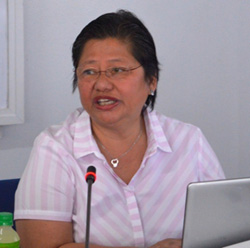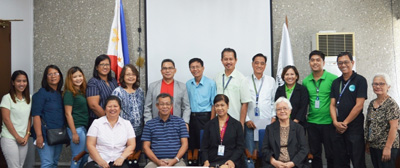 Three years after its implementation, the R&D program “Plant Bio-stimulants and Elicitors from Radiation-modified Natural Polymers” produced several beneficial effects based on the program’s review and evaluation held recently.
Three years after its implementation, the R&D program “Plant Bio-stimulants and Elicitors from Radiation-modified Natural Polymers” produced several beneficial effects based on the program’s review and evaluation held recently.
The program aims to use radiation-modified carrageenan (RMC) as a plant growth promoter (PGP) in integrated nutrition management designs, improve plant health, and induce resistance to increase crop productivity in peanut, mungbean, and rice.
Dr. Lucille V. Abad of the Philippine Nuclear Research Institute of DOST (DOST-PNRI) presented the accomplishments and key findings of the project titled, “Evaluation of the Effects of Radiation-modified carrageenan on the Growth and Yield of mungbean and peanut.”
Abad reported that field experiments in Regions 2, 3, and 4A resulted in 16–51% increase in yield at RMC-PGP concentration of 50–200 parts per million (ppm).
Abad added that variation in the optimum concentration of RMC-PGP depend on the varieties of mungbean and peanut suited in the said regions.
Ms. Leylani M. Juliano of the Philippine Rice Research Institute (PhilRice) presented the second project titled, “Elucidation of Growth Promotion Mechanisms of Radiation-modified Carrageenan on Rice.”
The project aims to study the synergistic mechanism of RMC in its growth promoting effects on rice under greenhouse and field conditions.
Juliano reported that the application of 300–400 ppm RMC-PGP showed promising beneficial effects in rice, such as higher seed germination rate, more tillers and panicles, and higher yield compared with other treatments.
Meanwhile, Dr. Gil L. Magsino, Director of the National Crop Protection Center (NCPC) of the University of the Philippines Los Baños (UPLB), presented the potential use of RMC-PGP to induce resistance against major pests and diseases in rice under greenhouse and field conditions.
Magsino stressed that the application of RMC-PGP induces resistance against Tungro virus in inbred rice and bacterial leaf blight in hybrid rice under field conditions. He also cited that applying RMC-PGP can be an innovative approach to combat pests and diseases of rice, thereby improving crop productivity.
 Dr. Jocelyn E. Eusebio, Director of the PCAARRD Crop Research Division (CRD) led the terminal review and evaluation along with Dr. Pompe C. Sta Cruz, Director of the Institute of Plant Breeding of the College of Agriculture and Food Science at the University of the Philippines Los Baños (IPB, CAFS-UPLB) and Dr. Erlinda S. Paterno, Professor Emeritus of the Agricultural Systems Institute of CAFS-UPLB.
Dr. Jocelyn E. Eusebio, Director of the PCAARRD Crop Research Division (CRD) led the terminal review and evaluation along with Dr. Pompe C. Sta Cruz, Director of the Institute of Plant Breeding of the College of Agriculture and Food Science at the University of the Philippines Los Baños (IPB, CAFS-UPLB) and Dr. Erlinda S. Paterno, Professor Emeritus of the Agricultural Systems Institute of CAFS-UPLB.
The technical evaluators, for its part, suggested a separate study on the role of RMC-PGP in enhancing plants’ physiological processes. The project, as suggested, is deemed to be a crucial parameter in explaining how RMC-PGP affects the growth, yield, and resistance of selected agricultural crops.
Mr. Angelito T. Carpio, DOST-PCAARRD Industry Strategic S&T Program (ISP) Manager for Rice, delivered the event’s synthesis, as he reminded the program team to submit all the required terminal reports and documents.
The R&D Program on Carrageenan is one of the programs under the ISP for Rice with the main goal of increasing rice productivity by 34% from 4.02–5.40 tons/hectare by 2020.
Held at the headquarters of the Philippine Council for Agriculture, Aquatic and Natural Resources Research and Development of the Department of Science and Technology (DOST-PCAARRD), the program’s review and evaluation was attended by other DOST-PCAARRD staff from CRD, Applied Communication Division (ACD), and Technology Transfer and Promotion Division (TTPD).
